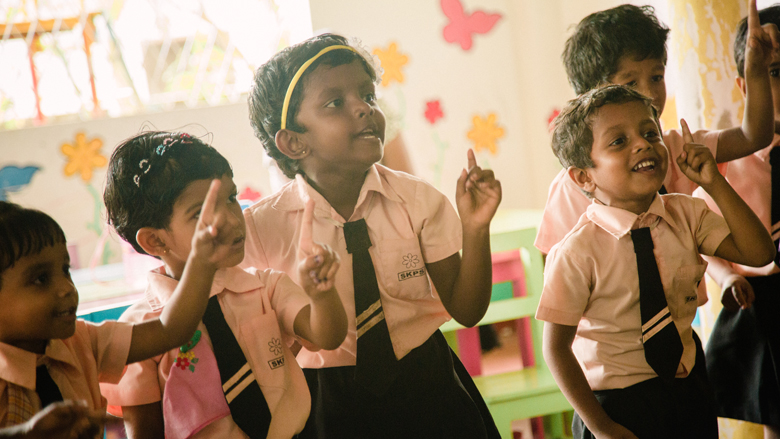Today, Lalani Damayanthi Perera is pretending to be a crow. A teacher at the Singithi Kekulu Pre-school and Day Care Centre, Lalani and her assistant (who is wearing a fox mask) are acting out the classic Aesop fable for a group of 40 Sri Lankan children, all of whom are under the age of five. In the story, the fox uses flattery to trick the crow into dropping a piece of cheese; as Lalani gives out a loud ‘caw’, the children giggle.
Lalani learned how to use drama effectively in the classroom at a training on early childhood development. “Before I used to use only picture cards and books to narrate stories,” she says, explaining that acting is both more fun and more effective. The children can re-tell the story at home, and their recall is improved. “Even if we ask after a month’s period, they remember how the teacher acted.”
Lalani received her training through the first stand-alone Early Childhood Development (ECD) project supported by the World Bank in South Asia. As part of the project, a National Census of ECD centers has helped identify key challenges, including the urgent need to -upgrade facilities and to provide training for teachers, child development officers, and parents of young children.
Promoting early childhood development is promoting equity
Lalani knows that the socio-economic status of families around her plays a big role in whether children are sent to pre-school or not. Some families struggle to scrape together the fees. “The families around our preschool in our village are poor,” says Lalani, adding that many are daily wage laborers employed as masons, carpenters or gardeners.
Lalani’s experience confirms why Sri Lanka must pay special attention to improving access to ECD for children from all kinds of socio-economic backgrounds, in all parts of Sri Lanka.
The latest net enrolment rates for ECD across wealth quintiles reveal how approximately 54 percent of children from Sri Lankan households in the highest quintile are enrolled in preschool, compared to only 44 percent from the lowest quintile. It is clear, even at the highest quintiles, that there is significant room for improvement. Disparities also exist between urban and estate sectors, with 54 percent enrolment in cities, compared to 42 percent in the plantations, according to the latest Sri Lanka Household Income and Expenditure (HIES) data
This is a concern with studies establishing that . Early developmental delays can have long-term and potentially irreversible consequences. In this context, access to early childhood education can help equalize learning opportunities, and promote equitable development.

